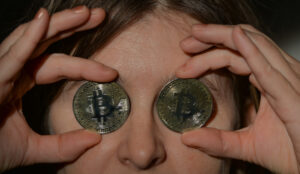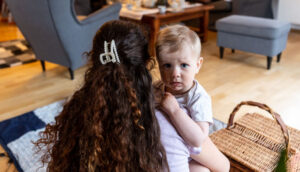Three or four years ago, I wrote a piece contemplating the end of cash. I wrote it as a mourner, lamenting how I would miss its heft, its solidity, its sheer physicality, in contrast to pinging and flicking invisible funds through the atmosphere. The other day, though, I realised my attitude had changed fundamentally. I am no longer a doughty champion of cash, but a digger of its grave.
When the end of coins and notes was first spoken of, I defiantly bought two purses for coins. One was a smart zip-up number, purchased at Gatwick Airport; the other, from the Glastonbury Oxfam, a secondhand blue cloth one with a brass snap-fastener and a mystical sequinned serpent. One for my hiking rucksack, one for town. No longer would I scrabble round for coins among all the other bits and bobs I carry with me. I would be quick, efficient, organised. And hang on to cash, on principle.
The system worked well for a time. But the purses grew steadily heavier. Eventually both got so weighty that they had to be exiled from their bags. This, I think, marked the beginning of my slide from grace. I went on paying with notes, because I liked the speed and snap of them; but I didn’t properly consider that I would get coins back. Now purseless, I put them loose in the bag, or in pockets, and began to resent them, or certainly all those smaller than 50p. Cash in the pocket has a useful just-in-case feel, but coins — even with the pleasing fatness of the one-pound sort — can’t impart even that.
The day my eyes were definitively opened, however, was at the beginning of October, when I went out for a pint of milk. I took my serpent-purse, adhering to the self-imposed rule that purchases smaller than ten pounds had to be made with cash. My satisfying ulterior motive was to rid that purse of roughly half its weight. The nice Kurdish grocer, who called me “darling” and whose shop was called “Hope Grocery”, surely wouldn’t mind. The only event that seemed to trouble him was the pungent old man who came in most evenings, blocking the aisles with cheery chat, whom he would trail after anxiously with the air-freshener spray. So I went out boldly into the dark.
It was not the usual chap but one of his friends, fatter, bearded and locked to his phone. When I took the milk to the counter, he did not look up for a while. When at last he did, it was to see me still arranging pence and two-pence pieces into neat small piles. I seemed to be slower at this than in the past. Two customers were fidgeting behind me. And at that point a heretic-thought struck me like a knife: why on earth was I going through this laborious performance? Why was I indulging myself by being primitive? Because primitive was how I felt: as if I’d insisted on making fire by rubbing two sticks together, rather than striking a match for an instant flash and a flare.
Cash also seemed slightly distasteful. Covid, of course, made us newly aware of this. In some countries (I think especially of Egypt and India, both places I otherwise adore), even the notes from an ATM are so used that they are limp and dirty, and after each handling I would compulsively sanitise my hands. But even here in the oh-so-clean and disinfected West, my sons object to sixpences and old threepenny bits being lodged in the Christmas pudding. They can do without that sort of luck.
This change of heart had been happening so subtly that I’d hardly noticed it. The ease, swiftness and curious satisfaction of tapping a card on a reader has overtaken that ancient source of happiness, having the right change; indeed it’s an action so swift and so satisfying that you can almost dance as you do it. A card weighs nothing, slips into a pocket, obviates the need for a bag at all (for I heartily dislike bags, a woman’s burden), and is therefore liberating. The perfectly sound alarms about Big Brother, criminal networks and stolen identity pale beside the sheer exuberant ease of the thing. If Big Brother wants to know that I used my card today to buy a pain chocolat, a packet of redbush tea and a pot of weatherproof paint, he is welcome.
At the same time, my fondness for cash has been diminishing. As a child in pre-decimal times, I adored coins: not only because I didn’t have many, but because they were also magical, almost numinous things. The pretty flowered sixpence that appeared under my pillow when I lost a tooth; the heavy, majestic half-crown that nestled in the very toe of a Christmas stocking; the many-sided threepenny bit, like a little castle, complete wight portcullis; and the cheeky, worthless farthing, with its wren. A new coin was a treasure, as fine and glittering as a jewel. Decimalisation, for no good reason, made the coins duller and lighter. They were characters no longer, only a means of exchange.
And what of cash now? Perhaps it will join the ranks of all those curious items that were once ubiquitous, the bodkins and tinder-boxes and stems of clay pipes, the game-counters and hatpins that wash up continually out of the Thames mud; or the old cardboard bus tickets and elaborate receipts from long-closed-down department stores, which shake out of secondhand books. They will rattle around in drawers, and grow dull in their uselessness. Instead of feeling a fond cousinage with the obols, sesterces and thalers of distant empires, we will simply marvel that things were ever done this way. What now still clatters at the margins of our lives will be compressed between the PVC pages of an album: interesting, but dead.
But of course what we will have lost will not merely be coins and notes. It will be, first, the quotidian instinct to budget: to stay within the span of whatever is in your pocket or wallet, and not exceed it. Credit cards began to sound the knell for that, but I still enjoyed until quite recently taking only a fiver on walks, tucked into a top pocket of my dreadful old walking jacket. Now, somehow, my bank card has slipped in too, quite spoiling my sense of virtuous limitation.
Second, we shall lose the mental exercise of getting the right coins together and calculating, most happily before any machine, the change due. For many of us who wept over maths at school, this was the only sort of arithmetic we regularly practised. It kept the brain alert as well as any crossword or Sudoku. Now each transaction involves no mental agility; our funds flow out unheeded and unregarded. Increasingly, I don’t bother to notice the price of lunch or a trawl through Boots; if I need it, I buy it. It’s good not to be obsessed by the hoarding or lavishing of money, but such utter disconnection is unhealthy.
Last of all, the loss of cash will contribute to the unanchored character of much of modern life. Now that we can communicate and work from anywhere, many of us are no longer tied to any particular place. “Where is she?” is a common question round the office, often meaning what time zone rather than which city. Community hubs, whether pub, shop or church, have emptied, and even school may be virtual. Too many interactions are with chatbots which have no faces, bodies or human understanding. The material networks that weave us together are now largely unfeeling. Cash, though, demands a physical connection, however brief. A mouth speaking. A hand touching a hand.
Disclaimer
Some of the posts we share are controversial and we do not necessarily agree with them in the whole extend. Sometimes we agree with the content or part of it but we do not agree with the narration or language. Nevertheless we find them somehow interesting, valuable and/or informative or we share them, because we strongly believe in freedom of speech, free press and journalism. We strongly encourage you to have a critical approach to all the content, do your own research and analysis to build your own opinion.
We would be glad to have your feedback.
Source: UnHerd Read the original article here: https://unherd.com/




